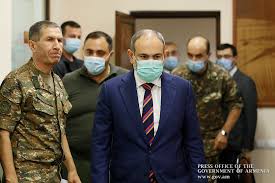
To read the first article of this series, click here.
As we explained in our previous article, Armenia has been going through tough times since the beginning of the 2020 Karabakh War on 27 September 2020. When the clashes ended on 10 November 2020 by the signing of a Russia-brokered ceasefire, even a blind man could see the disastrous defeat that Armenia faced in the battlefield, notwithstanding the myth of the strength of the Armenian army that had long been propagated by the Armenian elite to the Armenian people. Armenian analysts, who were disinforming their own people about Azerbaijani military advances while mocking the Azerbaijani media and official statements during the war, could do nothing more than lapsing into silence afterwards. Then, a blame game for the defeat began among the Armenian elite.
The opposition, most of which gathered under the Homeland Salvation Movement, volley bombs Prime Minister Nikol Pashinyan for the defeat. President A. Sarkissian, too, finger points Pashinyan as the culprit of the defeat, though in a more veiled way. What shook everyone, however, was the rigorous involvement of the Armenian General Staff into this blame game.
While uproar over the blame game had been continuing, on 25 February, more than forty high ranking military officers, including the Chief of General Staff Onik Gasparyan, issued a statement that directed heavy criticisms to Pashinyan and called upon him to step down from the prime ministry. This statement reads as follows:
The General Staff of the Armed Forces of the Republic of Armenia expresses its resolute protest against the dismissal of the First Deputy Chief of the General Staff of the Armed Forces of Armenia for short-sighted reasons, which was carried out without taking into account the national-state interests of Armenia. In such difficult conditions for the country, such a decision is an anti-state, irresponsible step.
The Prime Minister of the Republic of Armenia, the government, are no longer able to make adequate decisions in this critical situation for the Armenian people.
For a long time, the Armed Forces patiently tolerated the ‘attacks’ aimed at discrediting the Armed Forces by the current government, but everything has its limits.
The Armed Forces has fulfilled its duty with honor, to fight with its people against the enemy.
The inadequate governance of the current authorities and serious mistakes in foreign policy have brought the country to the brink of collapse.
Due to the current situation, the Armed Forces demand the resignation of the Prime Minister and the government, at the same time warn them to refrain from using force against the people whose children died defending the Homeland and Artsakh. The army has always been with the people, as the people have been with the army [emphases added].
Pashinyan condemned this as an attempt coup and dismissed Gasparyan. However, President A. Sarkissian rejected to approve this dismissal. At the present, the case is in front of the Constitutional Court, which will make the final decision as to the dismissal of Gasparyan. However, due to the law, Gasparyan will remain suspended until this decision.
The row between Pashinyan and the General Staff was sparked on 16 February by former President Serzh Sargsyan, who was toppled by the Pashinyan-led ‘velvet revolution’ in 2018. That day, S. Sargsyan, in a TV interview, criticized Pashinyan for making use of the Russian-made Iskander missiles too late, only in the last days of the war, when Armenia had already lost the war. He said that Iskander missiles should have been used earlier and against targets in Azerbaijan. This was a salvo by S. Sargsyan against his arch enemy Pashinyan for mismanaging the war.
Pashinyan answered S. Sargsyan on 23 February. Again, in an interview, he stated that Iskander missiles were useless and the missiles that were fired did not explode “or maybe 10 percent of them exploded.” Pashinyan said “let him [S. Sargsyan] ask the question, why didn’t the Iskander missile explode? Or why did it explode by 10 percent, for example?” Referring to a statement of S. Sargsyan after the 2016 Four-Day War, the first major battle in years during which Azerbaijan retook several strategic posts, Pashinyan rhetorically said “maybe they were weapons from the ‘80s.”
To remind the reader, after the 2016 Four-Day War, the then President S. Sargsyan at a press conference in Germany said that Armenia “was still fighting with guns from the 1980s,” arguably as an excuse for the loss of the battle. Also to remind, in January 2020, however, bragging over the modernization of the Armenian army through the acquisition of Russian arms, Pashinyan stated that “the Government of Armenia has closed the shameful chapter of the 80’s weapons, because the weapons that we acquired are either manufactured in 2019 or brand new, unused.”
What turned the spark into a fire was the First Deputy Chief of the General Staff Tiran Khachatryan’s remarks on Pashinyan’s comments on the Iskander missiles a day after. According to Yerevan Today (an Armenian media outlet), when asked about Pashinyan’s allegation on the ‘10% explosion’ of the Iskander missiles, Khachatryan “laughed for a long time” and said Pashinyan’s statement was “not serious” and his assessment was “superficial.” He also warned not to make incautious comments that may jeopardize relations with Russia. Upon that, Pashinyan dismissed Khachatryan, who, in stark contrast, had been awarded with the title of National Hero of Armenia after the 2020 Karabakh War a few months ago. This led to the statement signed by more than forty military officers and Pashinyan’s response as mentioned earlier.
These developments reveal some important features of the current state of Armenia. To begin with the brawl between Pashinyan and the ex-President S. Sargsyan, it can be seen that, even at a time of turmoil, they see no harm to continue their battle royal without hesitating to add fuel to the fire in the country. It seems that their hatred towards each other and their desire to acquire political power forestall the responsibility of using common sense for the benefit of Armenia. Here, what is important is that neither S. Sargsyan nor Pashinyan is a simple deputy; they are the two leaders that have run/is running the country.
Pashinyan’s words about the ‘10% explosion’ of the Iskander missiles, which are truly hard to make sense of, are also striking. In fact, these words are a fresh example of Pashinyan’s unreasonable and incoherent thinking and extravagant style. Such careless and contradictory statements and behaviors, which Pashinyan is never short of, make it difficult to regard him as a sophisticated and serious leader.
At first glance, ex-First Deputy Chief of the General Staff Tiran Khachatryan’s remarks on Pashinyan’s imprudent statement could be perceived as an uncontrollable, emotional reaction. However, Khachatryan is not some common person on the street, but the First Deputy Chief of the Armenian General Staff. A person at such a high-ranking position does not have the luxury to act temperamentally before the public.
All these developments expose the immaturity of the Armenian political class, Pashinyan’s lack of qualities expected from a statesperson, and the low level of professionalism of the high command of the Armenian army.
Yet, there is more.
Both Khachatryan’s warning about the relations with Russia and the 25 February statement demonstrates a disaccord between Pashinyan’s government and the army concerning Armenian foreign policy. In fact, the 25 February statement reveals that General Staff is critical not only of Pashinyan’s foreign policy, but also of his rule in general. These demonstrate that there is a serious crack between Pashinyan government and the General Staff, which has grown only bigger since the last couple of months.
The crack between the Pashinyan government and the General Staff brings about the critical question of civilian-military relations. As mentioned above, Pashinyan deemed the 25 February statement as an attempted coup. Although tanks are not patrolling in the streets of Yerevan, at least for now, technically speaking, this statement can in fact be regarded as a coup attempt. For now, it is yet to be seen how this tension, as well as the strife between Pashinyan and the opposition (discussed in the first article of this series), some sections of which openly calls for the armed overthrow of the former, will unfold.
*Photo: Caucasus Plus
© 2009-2025 Center for Eurasian Studies (AVİM) All Rights Reserved
No comments yet.
-
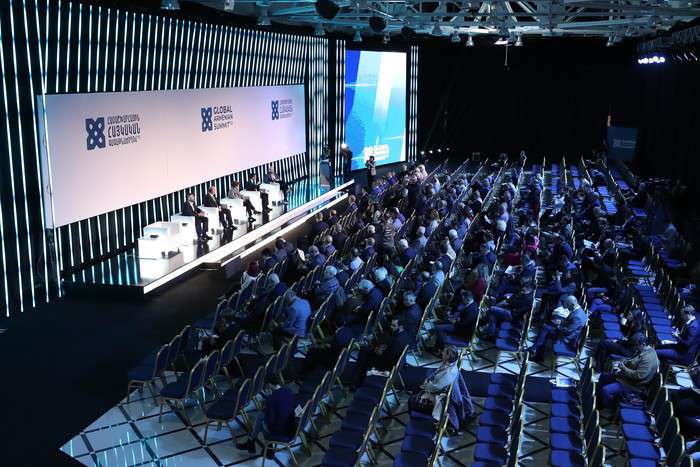 YET ANOTHER ARMENIA-DIASPORA SUMMIT: CONSTANT DEJA VU
YET ANOTHER ARMENIA-DIASPORA SUMMIT: CONSTANT DEJA VU
Turgut Kerem TUNCEL 07.11.2022 -
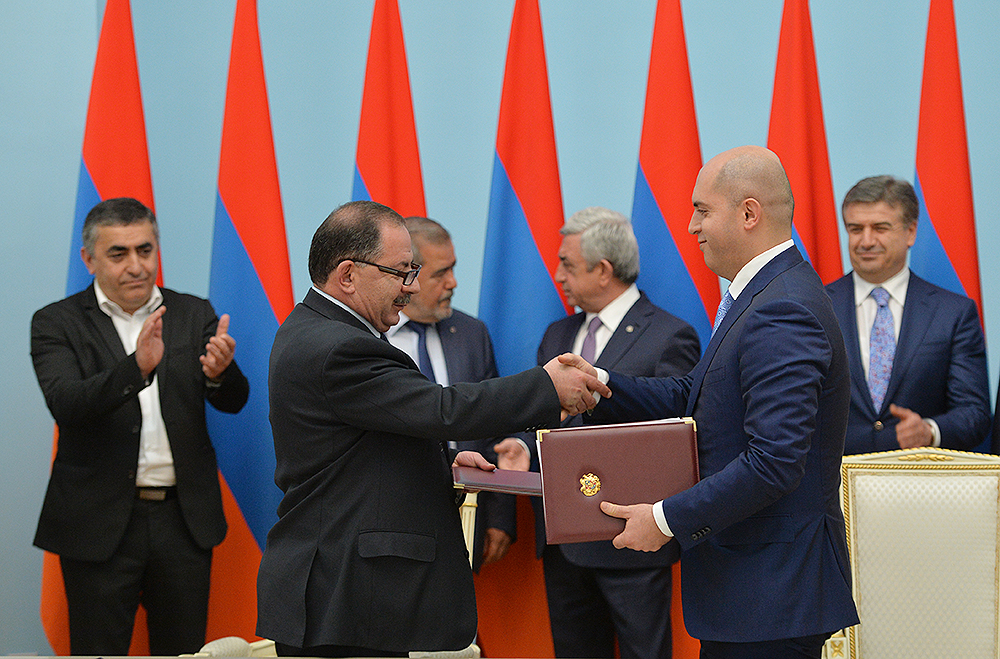 COALITION MEMORANDUM BETWEEN THE RULING RPA AND THE ARF IN ARMENIA: NOTHING NEW AFTER THE 2 APRIL 2017 ELECTIONS
COALITION MEMORANDUM BETWEEN THE RULING RPA AND THE ARF IN ARMENIA: NOTHING NEW AFTER THE 2 APRIL 2017 ELECTIONS
Turgut Kerem TUNCEL 16.05.2017 -
 PASHINYAN CALLS ON ARMENIAN DIASPORA TO BEHAVE RESPONSIBLY
PASHINYAN CALLS ON ARMENIAN DIASPORA TO BEHAVE RESPONSIBLY
Turgut Kerem TUNCEL 04.10.2024 -
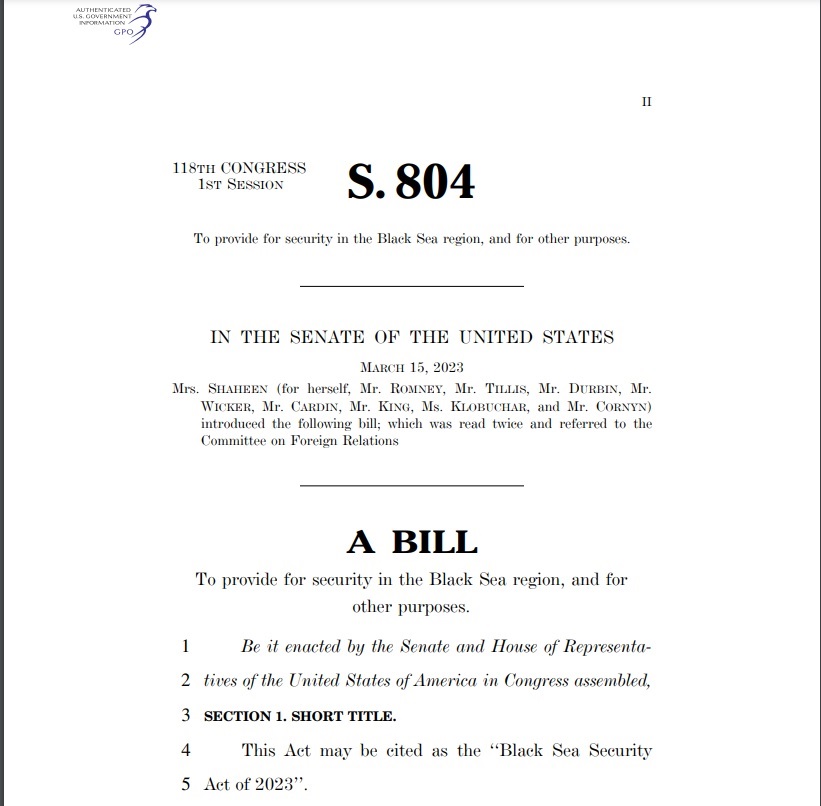 “WHAT HAPPENS IN THE BLACK SEA DOES NOT STAY THERE:” THE CONTOURS OF THE US’S BLACK SEA STRATEGY
“WHAT HAPPENS IN THE BLACK SEA DOES NOT STAY THERE:” THE CONTOURS OF THE US’S BLACK SEA STRATEGY
Turgut Kerem TUNCEL 29.11.2023 -
 AN APPEAL OF THE ARMENIAN AND AZERBAIJANI CIVIL SOCIETY ACTIVISTS TO THE PRESIDENTS OF ARMENIA AND AZERBAIJAN
AN APPEAL OF THE ARMENIAN AND AZERBAIJANI CIVIL SOCIETY ACTIVISTS TO THE PRESIDENTS OF ARMENIA AND AZERBAIJAN
Turgut Kerem TUNCEL 05.12.2016
-
DIASPORA ARMENIANS AND THEIR INITIATIVES FOR COMPENSATION: THE REFLECTIONS OF THE MOVSESIAN CASE
Aslan Yavuz ŞİR 27.02.2012 -
 THE NEW PRESIDENT OF THE EUROPEAN PARLIAMENT AND EUROPE'S FREEDOM VALUES
THE NEW PRESIDENT OF THE EUROPEAN PARLIAMENT AND EUROPE'S FREEDOM VALUES
Hazel ÇAĞAN ELBİR 11.02.2022 -
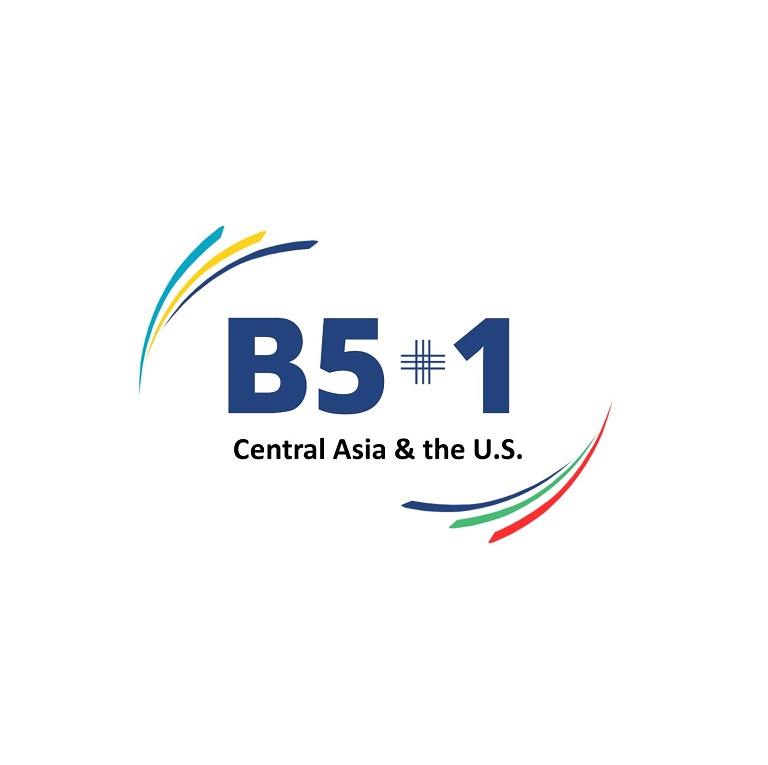 THE B5+1 FORUM AND “THE GREATER CENTRAL ASIA”
THE B5+1 FORUM AND “THE GREATER CENTRAL ASIA”
Gülperi GÜNGÖR 04.04.2024 -
 16TH SUMMIT OF BRICS LEADERS
16TH SUMMIT OF BRICS LEADERS
Gülperi GÜNGÖR 19.11.2024 -
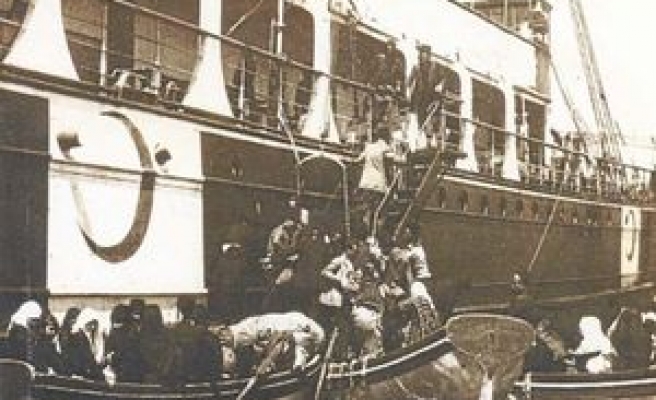 ON THE POPULATION EXCHANGE BETWEEN GREECE AND TURKEY
ON THE POPULATION EXCHANGE BETWEEN GREECE AND TURKEY
AVİM 02.03.2020
-
25.01.2016
THE ARMENIAN QUESTION - BASIC KNOWLEDGE AND DOCUMENTATION -
12.06.2024
THE TRUTH WILL OUT -
27.03.2023
RADİKAL ERMENİ UNSURLARCA GERÇEKLEŞTİRİLEN MEZALİMLER VE VANDALİZM -
17.03.2023
PATRIOTISM PERVERTED -
23.02.2023
MEN ARE LIKE THAT -
03.02.2023
BAKÜ-TİFLİS-CEYHAN BORU HATTININ YAŞANAN TARİHİ -
16.12.2022
INTERNATIONAL SCHOLARS ON THE EVENTS OF 1915 -
07.12.2022
FAKE PHOTOS AND THE ARMENIAN PROPAGANDA -
07.12.2022
ERMENİ PROPAGANDASI VE SAHTE RESİMLER -
01.01.2022
A Letter From Japan - Strategically Mum: The Silence of the Armenians -
01.01.2022
Japonya'dan Bir Mektup - Stratejik Suskunluk: Ermenilerin Sessizliği -
03.06.2020
Anastas Mikoyan: Confessions of an Armenian Bolshevik -
08.04.2020
Sovyet Sonrası Ukrayna’da Devlet, Toplum ve Siyaset - Değişen Dinamikler, Dönüşen Kimlikler -
12.06.2018
Ermeni Sorunuyla İlgili İngiliz Belgeleri (1912-1923) - British Documents on Armenian Question (1912-1923) -
02.12.2016
Turkish-Russian Academics: A Historical Study on the Caucasus -
01.07.2016
Gürcistan'daki Müslüman Topluluklar: Azınlık Hakları, Kimlik, Siyaset -
10.03.2016
Armenian Diaspora: Diaspora, State and the Imagination of the Republic of Armenia -
24.01.2016
ERMENİ SORUNU - TEMEL BİLGİ VE BELGELER (2. BASKI)
-
AVİM Conference Hall 24.01.2023
CONFERENCE TITLED “HUNGARY’S PERSPECTIVES ON THE TURKIC WORLD"









